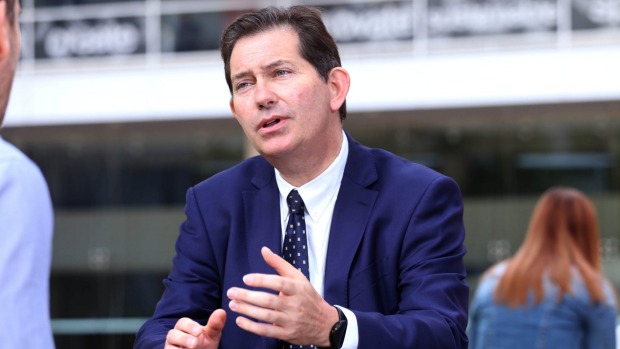EXCLUSIVE
Universities ignore ATAR scores
Up to 99% of applicants for some NSW university degrees have been admitted despite failing to meet the minimum ATAR score advertised for the course. Eryk Bagshaw reports.
PT1M20S 620 349The Vice-Chancellor of the University of New South Wales has called for an end to the ATAR university admissions system as it currently stands, after a Fairfax Media investigation revealed that the practice of admitting students with low marks was rampant across the sector.
UNSW's Vice-Chancellor Ian Jacobs said NSW should move away from the ATAR as the only measurement of academic success as quickly as possible.

Ian Jacobs, Vice-Chancellor of the University of NSW.
"We need a set of criteria that identifies the most talented students from all backgrounds, not ATAR alone," he said.
On Tuesday, an analysis of confidential data from the University of Sydney, Macquarie, Western Sydney University and UNSW revealed that students with ATARs as low as 30 were being offered places in business, teaching and engineering degrees.
An ATAR [Australia Tertiary Admissions Rank] is given to more than 50,000 NSW high school students in December each year. It has become the uniform four-digit rank to measure a student's ability against what universities believe is the minimum academic standard required to complete a course, as well as supply and demand for the degree.
In an opinion piece for Fairfax Media, Professor Jacobs' deputy, Iain Martin, argues there should be radical changes to the admissions process.
"Reducing six years of education to a single ranking is simplistic, let's have a constructive debate about what could replace the ATAR alone as a fairer, more comprehensive and contextual measure of academic potential". The measures could include secondary school performance in specific subjects beyond the HSC relevant to a particular degree and taking a students background into account before final marks are generated.
Richard Hill, a researcher in university management at Griffith University, said that the admission of students who were barely capable of completing an essay was a "chronic" problem throughout the tertiary education industry.
"If you have a pulse you can get in," said Professor Hill. "It's a very serious issue at the coalface for academics who often have to teach students who are semi-literate, if you ask any academic that has become a massive concern".
"We've known about diminishing standards, pressures on academics, and letting people into courses with ATARs of 30, how on earth are they getting away with this without a public inquiry?"
He said the the low quality of candidates entering universities put the future of the Australian workforce at risk, particularly in key industries such as nursing and engineering.
"Employer organisations have been saying for a long time that a lot of graduates coming out of universities aren't equipped to go into the workforce".
The fallout comes as Federal Education Minister Simon Birmingham announced on Wednesday that record numbers of students had enrolled in higher education in 2016, with 1.2 million students now undertaking tertiary courses.
The 3 per cent increase in student numbers since 2014 has brought the total cost to taxpayers up to $16 billion this year on the back of un-capped student places. Since 2012 universities have been able to enrol as many students as they want.
Mr Birmingham said that although the demand-driven system has provided unprecedented access and must be protected it has come at a significantly higher cost to the taxpayer.
"Recent attrition rates show that almost 15 per cent of these Australians do not progress to their second year. Universities must take responsibility for those students they choose to enrol and ensure they have the capabilities and support to succeed" .
The president of the NSW Board of Studies, Tom Alegounarias said the university admission system needed an overhaul to provide greater clarity on the academic ability of students.
"If universities use measurements other than the ATAR then those have to be transparent and reliable. It is crucial that students know what the rules are and what the bar they have to get over is," he said.
"If the bar changes without the students' knowledge then those who are most disadvantaged will suffer".

























20 comments so far
More comments
New user? Sign up
Make a comment
You are logged in as [Logout]
All information entered below may be published.
Thank you
Your comment has been submitted for approval.
Comments are moderated and are generally published if they are on-topic and not abusive.